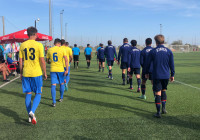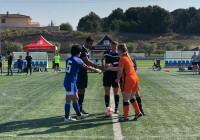Promotion of integrity and the protection of football matches and competitions means promoting integrity internally and to the public at all times, as well as protecting football matches and competitions against match manipulation as far as possible and under all circumstances.


It is essential that IFCPF and our CP Football stakeholders work to protect the integrity of the game and to fight against manipulation of football matches and competitions. This shall be achieved by establishing our commitment to adopting an effective approach towards any form of manipulation and/or the unlawful influencing of match incidents/results. The core pillars of this integrity policy are the promotion of integrity and the protection of football matches and competitions.
All IFCPF members should ensure they promote integrity at national level to its members, stakeholders and the public in general in a sustainable and supported manner. Secondly, each member should make sure that it protects the football matches and competitions organised under its jurisdiction against match manipulation under all circumstances.
| Promoting Pure Football |
Measures to promote integrity
IFCPF aims to promote fair and respectful CP Football competition throughout our membership, IFCPF personnel and wider CP Football family.
- Workshops - Educational and information sharing workshops may be used to inform and update players, team staff and IFCPF personnel on match manipulation, and their roles and responsibilites in promoting and ensuring pure football.
- Declarations - Prior to sanctioned competitions, players, team staff and International Technical Officials* must complete an online declaration that they agree to abide by IFCPF Rules and Regulations for Anti-Doping, Classification, Integrity and Sport Technical Rules. In doing so, acknowledge that a breach of the restrictions could result in disciplinary sanctions.
- Communications - IFCPF and LOCs shall use both direct and indirect communications channels to promote sport integrity and fair competition.
Cooperation
As the International Federation of CP Football and worldwide governing body, we work with a range of partners across our membership, events programme, football governance and para sport to develop understanding for all stakeholders and ensure fair competition.
| Match Manipulation |
Match Manipulation
A common definition of match manipulation defines it as an:
- “intentional arrangement, act or omission aimed at an
- improper alteration of the result or the course of a sport competition
- in order to remove all or part of the unpredictable nature of the aforementioned sport competition
- with a view to obtaining an undue advantage for oneself or for others."
Match manipulation is defined as conduct by anyone, who:
- “directly or indirectly, by an act or an omission, unlawfully influences or manipulates the course, result or any other aspect of a match and/or competition, or
- conspires or attempts to do so by any means.”
Stakeholders should note that any attempt to manipulate a football match or competition is sufficient for an individual to be convicted of match manipulation. This means that the manipulation itself does not have to be successful for a preliminary investigation to be conducted and for the conduct to be sanctioned.
a. Actions not connected to the field of play (actions off the pitch)
Actions not connected to the field of play, which could be subject to a preliminary investigation, basically involve any action, omission and/or agreement in order to manipulate football matches or competitions that do not take place during the match itself (in other words, the conduct does not occur on the pitch).
The following is a non-exhaustive list of examples of actions that are not connected to the field of play:
Match manipulation agreement and/or conspiracy
- Any agreement or conspiracy (orally or in writing) between a match-fixer and any other person(s) that is directed at unlawfully influencing or altering the result of a match
- Accepting, giving, offering, promising, receiving, requesting or soliciting any pecuniary or other advantage in relation to the manipulation of matches
b. Actions connected to the field of play
Actions connected to the field of play, which could be subject to a preliminary investigation, basically involve any action, omission and/or agreement to manipulate matches or competitions that take place during the match itself (in other words, the conduct occurs on the pitch by one or more of the participants).
The following is a non-exhaustive list of examples of actions that are connected to the field of play:
- The deliberate loss of a match or a phase of a match - e.g. conceding goals, being awarded yellow & red cards, conceding penalties
- The deliberate under performance by a football player during a match - e.g. poor defending or attacking
- The deliberate misapplication of the Laws of the Game by the referee and/or other match officials - e.g. wrongfully awarding red & yellow cards, penalties
- Interference with play, the playing surface or equipment - e.g. cutting the power supply of a football stadium
- Agreeing to receive compensation from a third party in exchange for achieving a positive result in a match or competition - e.g. playing well in connection with accepting a bonus from a third party that would like to provide some “extra motivation” to a player or referee
c. Omission
Match manipulation situations cannot only be committed through an action but also through an omission:
- Deliberately deciding not to take an action on the pitch even though it would be indicated by the Laws of the Game - e.g. unlawfully deciding not to award red & yellow cards, penalties, etc.
- Failing to comply with the duty to report a match manipulation approach, incident or suspicion - e.g. deliberately failing to report a match manipulation approach
d. Involvement with betting, gambling or similar activities
All persons involved in football shall be forbidden from directly or indirectly participating in betting or similar events related to football matches or competitions and/or any related football activities. Therefore, the following conduct could be the subject of an integrity investigation:
Direct involvement
e.g. a football player, a referee, a coach or an official places a bet on football matches or competitions and/ or any related football activity
Indirect involvement
e.g.
- A third party places a bet in their name on football on behalf of a person involved in football, and the person involved in football receives the money;
- A third party places a bet in their name and with their own money on a match together with a person involved in football, and they share the money;
- A person involved in football shares inside information on an upcoming football match with a third party, and the third party places a bet on this football match due to the information received.
| Reporting |
Reporting Mechanisms
Reporting to IFCPF Technical Delegate: Where possible reports should be submitted to the appointed Technical Delegate for the competiton to allow the report to be received and addressed as soon as possible.
Reporting though www.ifcpf.com: When someone wants to report an allegation, the first thing that they will most likely do is consult our website. Therefore, below is a link that leads to a dedicated confidential reporting form allowing any person to submit information (anonymously if needed).
Reporting via email: Any allegation of match manipulation or integrity-related corruption should be sent to info@ifcpf.com.
Types of evidence
This section explains the types of evidence that shall be admissible in disciplinary proceedings. Any type of proof that is relevant to the case may be produced in disciplinary investigations.
a. Direct evidence
Direct evidence can consist of evidence directly related to the fact in dispute (i.e. evidence of a witness who testifies to the truth of the fact to be proven, evidence directly related to the person under investigation, etc.).
b. Indirect evidence
Indirect evidence is also admissible if it meets the standard of proof of “comfortable satisfaction”. Direct evidence is not always necessary as long as the indirect evidence meets the “comfortable satisfaction” standard.
In this regard, below you will find an overview of possible indirect evidence that can be produced in disciplinary proceedings in regards to match manipulation and integrity-related corruption.
- Expert opinions/reports
- E-mails
- Letters
- Witness/party declarations
- Audio recordings
- Video recordings
- Betting reports
- Any kind of document
In proceedings, the deciding body shall have absolute discretion regarding the evaluation of evidence. In practice, this means that the bodies are allowed to:
- freely decide the evidentiary weight of any evidence on record without being bound by any predefined distinction between the kind of evidence; and
- freely deliberate between contradictory elements of evidence in their decision-making process.
| Investigations |
Investigations
The main objective is to establish the facts and details and, following a careful examination, evaluate whether to recommend the opening of disciplinary proceedings according to internal regulations through a final investigation report.
Investigation of potential match manipulation can include, but is not limited to:
- Interviews with the athletes and the athlete support personnel involved;
- Video-analysis of records done during the matches (in this or other competitions).
| Discipline |
Disciplinary Matters
A Disciplinary Committee shall be formed that is competent to conduct proceedings into match manipulation violations and to sanction any breach of regulations.
The Disciplinary Committee shall be formed of:
- One (1) Match Officials representative (whom was not the match referee)
- One (1) Local Organising Committee representative
- One (1) IFCPF Technical Delegate representative
The committee members will have no significant relationship with the affected party, will have had no involvement with the decision being appealed, and will be free from any other actual or perceived bias or conflict.
IFCPF may, at its own discretion, appoint up to two (2) additional representative to the Disciplinary Committee, to provide additional expert advice. These additional members shall be subject to the same conditions as with other appointed committee members to ensure impartiality.
The Discipline Committee has the power to levy further suspensions in cases of excessive misconduct, before and after the match.
Standard of proof
a. Standard of proof
The standard of proof is defined as "the level of certainty and the degree of evidence necessary to establish proof in criminal or civil proceedings".
IFCPF will seek to establish the relevant facts “to the its comfortable satisfaction having in mind the seriousness of allegation which is made”.
b. Comfortable satisfaction
The “comfortable satisfaction” standard has been defined as being greater than the mere “balance of probability” standard but less than the criminal standard of proof of “beyond reasonable doubt”.
- Beyond reasonable doubt: 100% No other logical explanation can be derived from the facts except that the defendant committed the offence, thereby overcoming the presumption that a person is innocent until proven guilty.
- Comfortable satisfaction: Being greater than the mere “balance of probability” standard but less than the criminal standard of proof of “beyond reasonable doubt”.
- Balance of probability/preponderance of evidence: The case that is the more probable should succeed.
| Sanctions |
Sanctions
Sanctions may be imposed by the decision of IFCPF in the form of one or more of the following:
- immediate disqualification of the person who violated the requirements and/or the team and/or delegation at the competition;
- cancellation of all results shown by the athlete / team / delegation in the relevant competition with all the ensuing consequences;
- confiscation of any medals, ranking points, or other awards;
- suspension from participation in CP Football competitions for a specified period of time;
- Publication of their names and suspension period;
- IFCPF reserves the right to impose further appropriate disciplinary action.
| Appeals |
Appeals
Nations have the right to appeal over any disciplinary sanction issued.
Any appeal should be submitted to the IFCPF Technical Delegate (during the event) along with the appeal fee of 100 EUROS.
An Appeals Committee shall be formed that is competent to review the proceedings into match manipulation violations, sanctions awarded and appeal received.
The Appeal Committee shall be formed of:
- One (1) Match Officials representative (whom was not the match referee)
- One (1) Local Organising Committee representative
- One (1) IFCPF Technical Delegate representative
The committee members will have no significant relationship with the affected party, will have had no involvement with the decision being appealed, and will be free from any other actual or perceived bias or conflict.
IFCPF may, at its own discretion, appoint up to two (2) additional representative to the Appeal Committee, to provide additional expert advice. These additional members shall be subject to the same conditions as with other appointed committee members to ensure impartiality.
The Appeal Committee has the power to levy further suspensions in cases of excessive misconduct, before and after the match.





